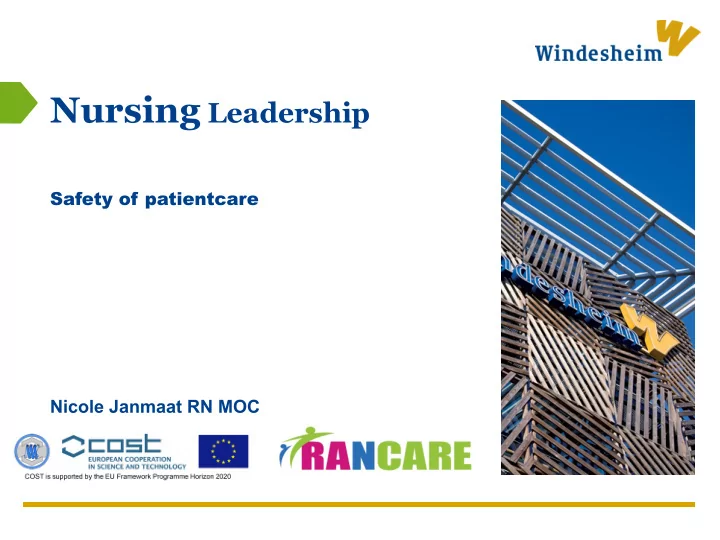

Nursing Leadership Safety of patientcare Nicole Janmaat RN MOC
Developments in care Elderly people and people with disabilities live • independently for as long as possible at home Shift from intramural care to interdisciplinary • collaborating professionals in the neighbourhood From "illness and care" to "health and behavior“ • Working from own strength, directing, self- • reliance ( van zorgen voor…. naar zorgen dat…) Work more intensively with citizens, clients, • informal carers and volunteers From welfare state to participatory society •
In Care extra attention: • Self-organizing teams that have : Attention to quality: testing against guidelines and standards • Critically reflecting on your own actions in healthcare practice: does the • current implementation of care and services meet the standard of quality? Evidence-based care in consultation with patient and carrying out his • informal network and renewing care and services Investing in own competence development: learning and working! •
New defenition of health In collaboration with the Health Council and ZonMw Huber - after thorough research - comes up with a new definition of health. And it reads: Health as the ability to adapt and to direct oneself in the light of the physical, emotional and social challenges in life.
Why a new nursing profile? Strong increase in the number of chronically ill and double aging; • importance of prevention Socio-cultural developments (qualitatively different requirements) • Cost effectiveness issues • Support for self-management • Changes in care provision and work process (task shifts) • Changing view on health •
Nursing-profile is basic for nursing education • changing health care in the 21st century • support self-management • clinical reasoning • prevention Training for nurses who are widely employable (three quarters of the nurses will have to deal with it with the elderly.)
New vision on care…… new nursing-profile…… new nursing education
CANMEDS Roles • Caregiver • Communicator • Collaborator • Healthprovider • Reflective EBP professional • Professional and quality of care improver • Leader, coördinator of care
Nursing leadership The definition of leader is influencing others to achieve goals (Huber, 2010).
Nursing leadership definition A nursing leader is someone who provides direct patient care and who is constantly focused on improving care by influencing others (Cook, 1999 ). Leadership based on expertise and knowledge of one's own profession. A nurse takes matters into account when it comes to caring for patients. (Plas & Crijns, 2010)
Florence Nightingale: 1820-1910 • • Was a nurse during the Crimean War, did research, led a team of scientists and wrote many books, articles and reports . • Florence Nightingale founded the first nursing courses in London in 1856.
Anyone can become a nursing leader if ) you manage the qualities of a nursing leader. Has a vision • Strategic ability • Can manage conflicts • Empathize • Is able to work together in a team • a leader figure is an optimist who takes initiative, is flexible, has • self-insight and (self) confidence.
„RANCARE Rationing - Missed Nursing Care: an International and Multidimensional Problem ” COST ACTION CA15208 European Cooperation in Science and Technology Horizon 2020 Competences of nurse 2016-2020 managers to minimize missed nursing care and enhance the quality and safety of patient care’
Competences of nurse managers to minimize missed nursing care and enhance the quality and safety of patient care’ Competences of nurses to enhance the quality and safety of patient care, nursing leadership.
Managerial and non-managerial nurses at all levels who • stimulate, instruct and inspire nurses to provide excellent care. Nursing leadership is motivating other nurses to care innovation. • Effective collaboration with colleagues and other professionals. • Setting priorities and increasing the quality of care (Koekkoek & • Schalken, 2010
Micro level, direct patiëntcare Coördinating the care of the patient • Stimulating role in the team for the best care • Keeping up with professional literature • Working according to the latest scientific insights •
Meso level Participate in workgroups on the ward • Participate in workgroups in the organisation • Nursing Advisory Council/ board • Member of a professional association, trade union • Macro level Influence politics •
Good quality of care • More and higher educated nurses ensure: • Lower patient mortality • • Less complications by patients • • Fewer errors by nurses • • Higher patient satisfaction • • Higher job satisfaction and less burnout among nurses • (McClure, Puolin , Sovie & Wandelt, 1983.)
Thank You
Recommend
More recommend